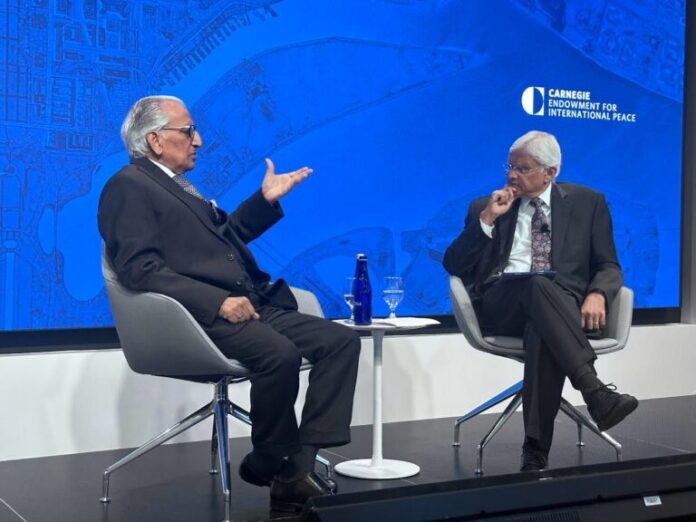NEW YORK, Mar 28 (APP): The visiting Special Assistant to the Prime Minister on Foreign Affairs, Syed Tariq Fatemi, has said that he was “very satisfied” over his talks in Washington with key U.S. officials and Congressional leaders in what he described as the first high-level contact with the Trump administration.
“I had very good response both from the State Department and at Capitol Hill– the meetings were productive,” he told UN correspondents in a news briefing at the Pakistan Mission to the United Nations on Thursday. Pakistan’s Ambassador-designate to the UN, Asim Iftikhar Ahmad, was also present.
Fatemi said he was sent by Prime Minister Shehbaz Sharif to get a sense of the Trump administration’s priorities for the South Asian region. In turn, he said he briefed his interlocutors about Prime Minister Shehbaz’s focus on boosting economic growth, trade and investment to make the lives of Pakistani people better as well as to enhance cooperation with all the big powers in an effort to achieve those objectives.
“We look forward to engaging with the Trump Administration on areas of mutual benefit” in an effort to further strengthen US-Pakistan relations.
During his two-day visit to the US capital, the Special Assistant met with Senior Bureau Official/Acting Under Secretary of State for Political Affairs Lisa Kenna and Senior Director for South and Central Asia National Security Council Ricky Gill.
He also met with Ranking Member Congressman Gregory Meeks, Chairman of the Sub-Committee on South and Central Asia, Congressman Bill Huizeng of the House Foreign Affairs Committee and Senator Jim Banks.
The special assistant said Pakistan’s population of 240 million and its youth bulge were important assets capable of driving national development as well as their role in the key IT sector.
Fatemi said that Pakistan government had worked hard to stabilize the country’s economy and put it on the path of growth. Inflation was down from 33 percent to just 1.5 percent, a feat achieved in one year. He also highlighted the recent staff level agreement with IMF for a new loan and the World Bank’s $20 billion investment in Pakistan over ten years.
The recognition of the improvement of economic indicators by the IMF and the World Bank was a proof that the economy was moving in the right direction, he added.
The special assistant said that there exists immense potential for promoting trade and economic relations between Pakistan and the US — not only benefiting the businesses of both countries but will also have a positive impact on the economy of the region.
He also said that significant agreements in the areas of economy, trade and investment will be concluded with UAE and Saudi Arabia in coming months.
Fatemi said that the Special Investment Facilitation Council (SIFC) has been set up to provide one-window operation to
facilitate investors.
Replying to a question, he said China was Pakistan’s “trusted friend”– the two countries have had close relations despite the change of governments on both sides amid challenging international environment.
China continues to be an important development and strategic partner of Pakistan., Fatemi said. While maintaining it close friendship with China, he said Pakistan can also have good relations with the United States.
About the rise of terrorist attacks in Pakistan, he said they were being conducted by TTP and other terrorist groups based in Afghanistan.
Those outfits now have sophisticated weapons left behind by the departing American troops as the Taliban closed in on Kabul in 2021.
The special assistant said that Pakistan remains committed to upholding the UN-promised right of self-determination of Kashmiris and Palestinians.
The Security Council, he said, must ensure the realization of that right for the Kashmiri people, and promote a just and lasting settlement of the Jammu and Kashmir dispute,
Expressing his outrage over the slaughter of Palestinians in Gaza, Fatemi backed the internally endorsed two-state solution to usher in peace and stability in the Middle East.
Pakistan, he said, stands for the UN Security Council reform to make the 15-member body more effective, efficient and representative. Pakistan was against adding new permanent members to the 15-member Council, which represent the aspiration of the people, especially those in the developing countries.

